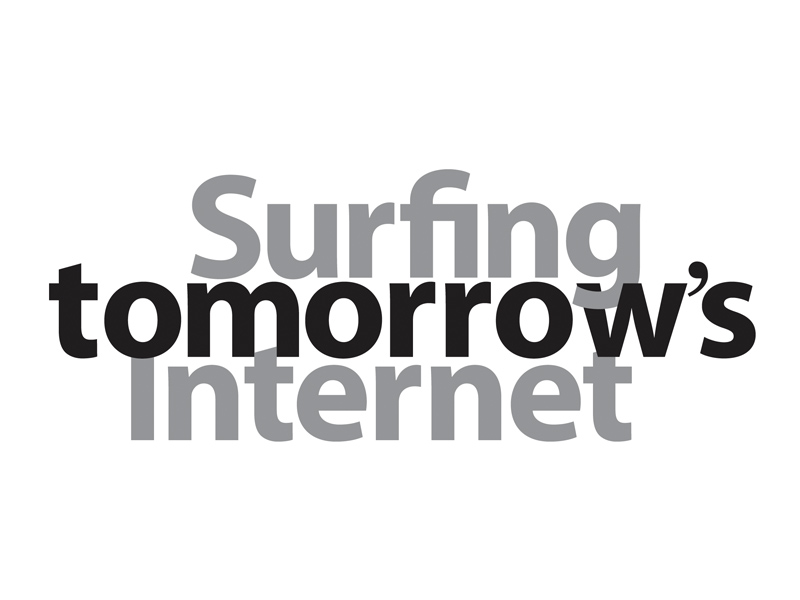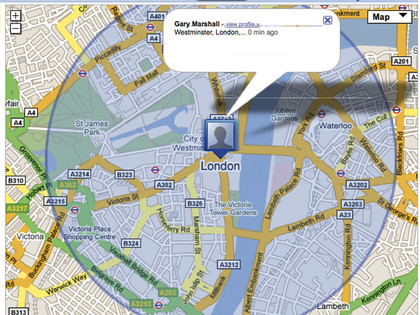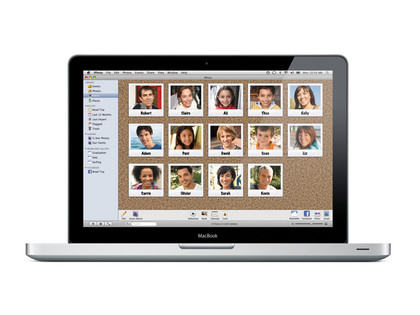
Sign up for breaking news, reviews, opinion, top tech deals, and more.
You are now subscribed
Your newsletter sign-up was successful
The way we connect to the internet has changed dramatically in a very short space of time. We're connecting with a wider range of devices than ever before, we're as likely to use mobile broadband as we are to connect via cables, and everything from cars to TVs are being internet-enabled.
The kind of information we're accessing is changing, too, with search engines indexing everything from databases to printed material and software harnessing the power of social networking. The internet is evolving. But what will it change into – and how will we use it?
More, more, more
For years, web searching was limited to the content of web pages – so when we looked for something, we were only looking at a tiny proportion of the information available online. Huge amounts of data were locked in the 'deep web', far from the reach of search engine spiders, and even more data was stored in formats such as audio and video clips that search engines couldn't scan. Suddenly, though, things are changing.
Google improved its indexing of Flash files in the summer of 2008, and its spiders can now see any textual content hidden within them. Both Google and Windows Live Search have also implemented basic face detection technology in their image search services, and Google began experimenting with ways to access the deep web in early 2008.
Its spiders can now automatically fill out online forms to access hitherto spider-unfriendly data on 'certain sites', although Google doesn't say which ones. We'll soon be able to search the content of multimedia files, too.
During the US Presidential campaign, Google unveiled Gaudi, an audio indexing service that enables you to search not just the data about video clips – the filename, user tags and so on – but the actual content of the clip. Want to know how many times Barack Obama mentioned change in a single speech? Gaudi can tell you.
Sign up for breaking news, reviews, opinion, top tech deals, and more.
Google is also indexing books and magazines through its Google Book Search service. For now, its efforts are largely US-based, but the long-term aim is to digitise any print title you can imagine and make it searchable online.
Last but not least, there's Twitter. Bear with us here: we're about to suggest that Twitter is going to be a big part of the web's future. While it's easy – and often entirely justified – to dismiss the micro-blogging service as a massive waste of time, it's possible to see it in a different way. We're thinking Google for brains.
Because Twitter is an ongoing conversation, its search page makes it an extraordinarily powerful real-time search engine. Traditional search engines can't index information before it's published, but a Twitter search enables you to search conversations as they happen. When they're talking about something important, such as a breaking news story that hasn't reached the mainstream media, Twitter provides information that you simply can't get anywhere else.
The result of all this is that we can access more data, from more sources – and from more locations – than ever before. The challenge is to make sense of it.
Where it's at
The more data you have, the harder it becomes to filter it. One way to reduce information overload is geolocation, where a search engine or site works out roughly where you are from your IP address and directs you to the most local site – so when you access Google or Windows Live Search from a UK IP address, the search engines will direct you to the UK site and give UK-specific results extra weighting.
This sort of geolocation is a fairly blunt instrument, but when GPS-enabled mobile phones and technology such as Skyhook (which can work out your location from Wi-Fi access points and mobile phone towers) can pinpoint you to a particular town or even address, it's possible to serve up extremely relevant results – especially for shopping, points of interest and other everyday information.
Although location awareness is best suited to mobile devices, there's no reason why it can't be used on the desktop too. Apple's forthcoming Snow Leopard operating system includes location-based services for all computers, not just mobile ones, and Google's new Latitude location-based service can be accessed from desktop PCs as well as mobile phones.

NEVER LOST: Google Latitude is a location-based service that enables you to see and message contacts that are nearby
As with other Google services, we'd expect the firm to publish an API so that developers can use Latitude for their own services, although for now it's more of a curiosity than a useful application.
You can also improve the relevance of search in other ways. If you sign into Google, you'll see icons next to each search result, enabling you to tell the company which sites you like and which ones you don't. If you wish, you can also get Google to track your browsing history, enabling you to reine search results based on what Google thinks you'll like.
As the amount of information we want to access increases, such automated systems – often described as agents – will become a key part of our online lives. However, while software can certainly reine search results, it's not as powerful as a much older technology: the human brain.
People power
When it comes to identifying people in photographs, your social-networking contacts will do a better and faster job than any software algorithm can manage, and if you're looking for recommendations – for products, films, places to go or anything else – people who know you or who have similar interests and tastes will come up with better recommendations than even the most finely tuned recommendation engine could.
If you're recruiting for staff then recommendations via a business-focused social network such as LinkedIn could prove more effective than traditional newspaper advertising or an online job ad. When you combine location-based computing, multiple sources of data and social networking with improvements in hardware, the results can be extraordinary.
Imagine being able to point your mobile phone at something and receiving relevant data about that object or place – such as a friend's comments about a restaurant, the history of a particular place, people's photos and videos or more interesting alternatives to where you're currently standing.
The hardware is already there – HTC's G1 Android phone has GPS and a compass, making Google Street View positively spooky – and other services are catching up fast.
All together now
Apple is – as always – ahead of the curve. The company is taking some of these ideas and putting them into products that you can buy right now. For example, if you take a photo with an iPhone, you can use the device's GPS chip to identify your location and store it in the photo's metadata. If you then import your photos into the latest iPhoto software, you can use that data to organise your images.

SNAP: Apple's new iPhoto app uses location awareness and social networking to tag your photos
The metadata is retained and can be exported to Flickr, where your images can be plotted on a map. iPhoto also includes an agent – in this case facial recognition software – that can scan your images and identify who's in each picture. The app takes advantage of social networks to help tag the images.
Apple has gone with Facebook for this: upload your images to your Facebook account, and when your contacts tag individuals in your photos, that data is downloaded to iPhoto in order to update your photo library.
Other products are less glamorous but more useful. TomTom's latest generation of sat-nav systems use anonymous mobile phone location data to study traffic low and warn users of snarl-ups. The firm also runs a LIVE service that provides over-the-air information including up-to-date petrol prices, weather forecasts, Google Local search and the ability to share information or send messages to friends.
Cars are also becoming increasingly connected. BMW's ConnectedDrive provides "telematic and online services". This means Google Maps, route planning and a portal where you and your friends can send messages to your car. You can even use the website to unlock your car if you've accidentally left the keys inside.
BMW isn't the only car company hooking its vehicles up to the internet. Ford's Sync delivers route planning, internet searching, customised news reports and sports scores. Its equivalent of BMW's remote unlocking gimmick is the Vehicle Health Report, which is called up by saying the words 'vehicle health' and according to Ford includes "diagnostics, scheduled maintenance [and] recall information".
The system is currently available as an upgrade for certain models, but the system will be rolled out to the entire US Ford range by the summer and into Europe in 2010. Ford predicts that it will have one million Sync-enabled cars on the road by the third quarter of 2009.